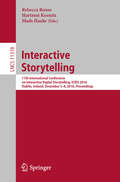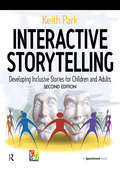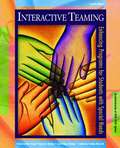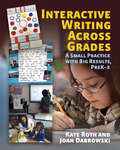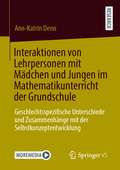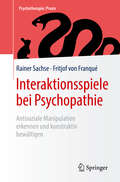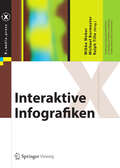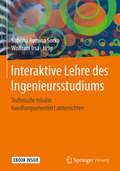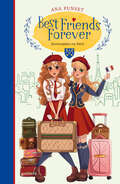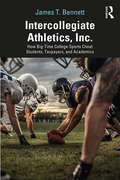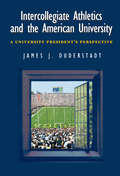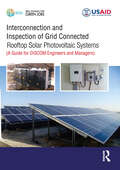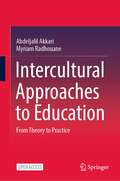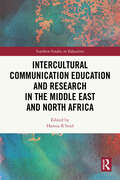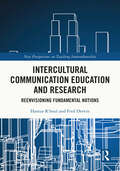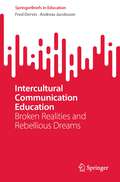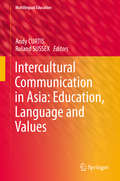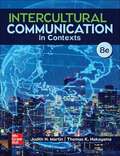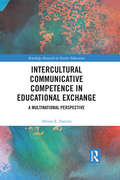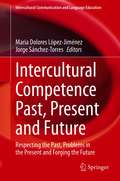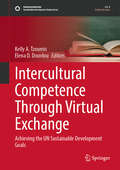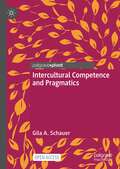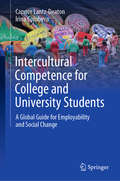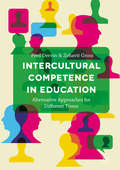- Table View
- List View
Interactive Storytelling: 11th International Conference on Interactive Digital Storytelling, ICIDS 2018, Dublin, Ireland, December 5–8, 2018, Proceedings (Lecture Notes in Computer Science #11318)
by Rebecca Rouse Hartmut Koenitz Mads HaahrThis book constitutes the refereed proceedings of the 11th International Conference on Interactive Digital Storytelling, ICIDS 2018, held in Dublin, Ireland, in December 2018. The 20 revised full papers and 16 short papers presented together with 17 posters, 11 demos, and 4 workshops were carefully reviewed and selected from 56, respectively 29, submissions. The papers are organized in the following topical sections: the future of the discipline; theory and analysis; practices and games; virtual reality; theater and performance; generative and assistive tools and techniques; development and analysis of authoring tools; and impact in culture and society.
Interactive Storytelling: Developing Inclusive Stories for Children and Adults
by Keith ParkInteractive storytelling, where the story is spoken or chanted, began as a way to include individuals with severe and profound learning disabilities in larger group activities, whether children at school or adults in day services. The stories are performed in call-and-response - one person calls out a line and the rest of the group respond either by calling back the same line or by calling out a pre-arranged response - and require no previous experience in drama or storytelling. They can be performed anywhere, by anyone. Various stories are explored, ranging from folktales and pantomime to poetry, the works of Charles Dickens, Shakespeare and stories from the Old Testament. Each extract details the full call-and-response for performing the story. This approach to storytelling can be used by teachers and group facilitators in a variety of settings and with any group of children or adults, irrespective of their level of disability. This hands-on manual will enable teachers, therapists, parents and anyone working with children or adults in community settings to use performance and recital to bring stories, drama and poetry to life for people of all abilities. 'This book is a useful resource...is simply written...is especially appropriate for people working with children and adults with speech, language and communication difficulties.' - Child Language Teaching and Therapy.
Interactive Teaming: Enhancing Programs for Students with Special Needs (4th edition)
by Vivian Ivonne Correa Hazel Jones Carol Chase Thomas Catherine Voelker MorsinkInteractive teaming in special programs is a concept of service delivery for school-age students who are currently placed in special education programs or are at risk for referral to such programs.
Interactive Writing Across Grades: A Small Practice with Big Results
by Kate Roth Joan DabrowskiWhen done on a regular basis, interactive writing has the potential to improve independent writing. Authors Kate Roth and Joan Dabrowski detail how this systemic approach can be applied in Interactive Writing Across Grades: A Small Practice with Big Results, PreK-5.' Interactive writing harnesses the natural interactions teachers have with their students as they compose a writing piece. It allows for real-time differentiation and tailored scaffolding. This method fits within any basal writing curriculum and can be adapted to your classroom's technology levels. This book acts as a how-to guide that unpacks this powerful method, going step-by-step and grade-by-grade to figure out where and how interactive writing fits within your literacy framework. Inside you'll find:A complete overview of the interactive writing method and how it fits into your balanced literacy program Concrete ways to launch interactive writing in your classroom to support both process and craft instruction Step-by-step guidance to implement the method with students of all ages Student examples of writing from grades Pre-K through 5 to show what to expect at each phase of the process 'Listen in on a Lesson vignettes that demonstrate the type of scaffolding you can offer during interactive writing lessons Discover what makes interactive writing a particularly effective teaching practice that can support both emergent and fluent writers. Interactive Writing Across Grades can help put this method to work in the classroom immediately. '
Interaktion zwischen frühpädagogischen Fachkräften und Eltern in der Kindertagesstätte: Eine rekonstruktive Analyse professionalisierter Praxis
by Annika KallfaßIn den letzten Jahrzehnten ist der Besuch einer Kindertagesstätte Teil der Normalbiografie von Kindern in Deutschland geworden und die Zeit, die Kinder in der Obhut frühpädagogischer Fachkräfte verbringen, hat sich verlängert. Diese Veränderung im generationalen Sorgeverhältnis wirft die Frage auf, welche Beziehungskonstellationen heute zwischen Kindern, Eltern und frühpädagogischen Fachkräften in Kindertagesstätten existieren. Obwohl dem Thema bereits große Aufmerksamkeit gewidmet wurde, ist die Datenbasis über das berufliche Wissen und Handeln frühpädagogischer Fachkräfte immer noch unzureichend. Forschungslücken werden insbesondere in Bezug auf die kollektive, organisationale und performative Dimension beruflichen Handelns festgestellt sowie bezogen auf die Grundfrage, wie Ziel und Güte beruflichen Handelns definiert werden können. In der vorliegenden Untersuchung werden videografierte Elterngespräche in Kindertagesstätten sowie audiografierte Gruppendiskussionen von frühpädagogischen Fachkräfte-Teams aus praxeologisch-wissenssoziologischer Perspektive bearbeitet. Die Ergebnisse sprechen dafür, Professionalisierungsprozesse in der Frühpädagogik nicht nur auf der individuellen Ebene der einzelnen Fachkraft zu adressieren, sondern sie im Zusammenhang mit Prozessen der Organisationsentwicklung anzuregen und zu fördern.
Interaktionen von Lehrpersonen mit Mädchen und Jungen im Mathematikunterricht der Grundschule: Geschlechtsspezifische Unterschiede und Zusammenhänge mit der Selbstkonzeptentwicklung
by Ann-Katrin DennMithilfe videobasierter Beobachtungen geht Ann-Katrin Denn in diesem Buch der Frage nach, ob Mädchen und Jungen im Unterrichtsgespräch des Mathematikunterrichts in der Grundschule von Lehrpersonen unterschiedlich eingebunden werden (bspw. durch Fragen, Aufrufe oder Feedback). Aufgrund der geschlechtsspezifischen Unterschiede im mathematischen Selbstkonzept wird außerdem untersucht, ob sich Aspekte der Interaktion unterschiedlich auf die Selbstkonzeptentwicklung von Mädchen und Jungen auswirken.
Interaktionsspiele bei Psychopathie: Antisoziale Manipulation erkennen und konstruktiv bewältigen (Psychotherapie: Praxis)
by Rainer Sachse Fritjof von FranquéIm vorliegenden Buch wird beschrieben, wie manipulatives Handeln von Personen mit Psychopathie erkannt und bewältigt werden kann. Die psychopathische Persönlichkeitsstörung (engl.: Psychopathy) ist definiert durch eine Kombination aus interaktionellen, affektiven, antisozialen und sich im Lebensstil ausdrückenden Besonderheiten, zu denen Egozentrizität, manipulierendes Verhalten, ein Mangel an Mitgefühl, Schuld und Reue, pathologisches Lügen, Verantwortungslosigkeit sowie die kontinuierliche Verletzung sozialer Normen und Erwartungen zählen. Fachleute haben vor allem Schwierigkeiten, mit den interpersonellen Merkmalen dieser Störung umzugehen. Dieses Buch bietet hierfür konkrete Unterstützung. Geschrieben für … Psychotherapeuten, Coaches, Diagnostiker, Psychiater, forensische Psychologen und alle, die beruflich mit Psychopathen zu tun haben. Die Autoren: Prof. Dr. Rainer Sachse ist Psychologischer Psychotherapeut, Begründer der „Klärungsorientierten Psychotherapie“ und Leiter des Instituts für Psychologische Psychotherapie (IPP) in Bochum. Fritjof von Franqué ist sexualforensischer Psychotherapeut und leitender Psychologe am Institut für Sexualforschung und Forensische Psychiatrie des Universitätsklinikums Hamburg-Eppendorf (UKE).
Interaktive Infografiken
by Michael Burmester Ralph Tille Wibke WeberIn einer Welt der Multimedialität gewinnt ein Visualisierungstyp zunehmend an Bedeutung: die interaktive Infografik. Sie wird im Journalismus ebenso eingesetzt wie in der Unternehmenskommunikation. Dieses Buch führt auf Grundlage aktueller Forschungserkenntnisse in Theorie, Design und Rezeption von interaktiven Infografiken ein: Wie werden sie wahrgenommen? Welche Vorteile bieten sie für das Verstehen und Behalten von Inhalten? Gibt es Gestaltungs- und Erzählmuster? Welche Methoden wenden Infografiker an? Mit Beispielen und Tipps von Experten.
Interaktive Lehre des Ingenieursstudiums: Technische Inhalte Handlungsorientiert Unterrichten
by Sabrina Romina Sorko Wolfram IrsaÜberdurchschnittlich viele Studierende in den ingenieurswissenschaftlichen Fächern brechen ihr Studium ab, am Arbeitsmarkt sind Ingenieure dagegen Mangelware. Umso lohnender ist da die Investition in eine zeitgemäße Didaktik. Unter der Berücksichtigung der zunehmenden Komplexität durch die Digitalisierung in den Ingenieurwissenschaften und am Arbeitsplatz zeigt das Buch, wie Lehrkräfte die Inhalte des Ingenieurstudiums und der technischen Lehre handlungsorientiert vermitteln können. Das Buch ist in zwei Teile gegliedert. Im ersten Teil präsentieren die Autoren die didaktischen Grundlagen. Sie erläutern grundlegende pädagogische Ansätze wie Kompetenz- und Handlungsorientierung im Unterricht und die Bedeutung von Lehr- und Lernzielen mit speziellem Fokus auf der Didaktik technischer Fächer. Daneben verknüpfen sie die theoretischen Grundlagen wichtiger technischer Fachgebiete mit den praktischen Anwendungen der unterschiedlichen Branchen.Der zweite Teil bietet einen didaktisch durchdachten Lehr- und Übungskatalog mit einem breiten Spektrum an Methoden, der zur innovativen Lehrstoffvermittlung anregt. Am Beispiel der ingenieurswissenschaftlichen Grundlagenfächer bereiten die Autoren die technischen Inhalte fachlich auf und skizzieren auf der Basis dieses Grundlagenwissens einen möglichen Kompetenzerwerb. Mit Hilfe dieses Katalogs können die Leser adäquate Lehr- und Lernmethoden auswählen.Mit ihrem Buch wollen die Autoren Lust machen auf eine neue, innovative Art der technischen Lehre. Ein handlungsorientiertes pädagogisches Handbuch für Dozenten an technischen Universitäten, Hochschulen und Technischen Fachschulen, das ergänzend zur technischen Fachliteratur eingesetzt werden kann.
Intercambio en París (Best Friends Forever #Volumen 3)
by Ana PunsetUna amiga conoce todas tus historias, tu mejor amiga las vive contigo. ¡No te pierdas las aventuras de Best Friends Forever! Julia y Alejandra han demostrado que si están unidas pueden con todo, ¡y ahora tienen la oportunidad de disfrutar juntas de París! Pero el intercambio con un colegio de élite pone a prueba su confianza en sí mismas… y también su amistad. Es el momento de demostrar que siempre se tendrán la una a la otra, porque pase lo que pase son… Best Friends Forever
Intercollegiate Athletics, Inc.: How Big-Time College Sports Cheat Students, Taxpayers, and Academics
by James T. BennettIntercollegiate Athletics, Inc. examines the corrupting influence and damaging financial effects of big-time intercollegiate athletics, especially football and to a lesser extent basketball, on American higher education. Including historical and contemporary perspectives, the book traces the growth of intercollegiate sports from largely student-run activities supervised by faculty to the gargantuan, taxpayer-supported spectacles that now dominate many public universities. It investigates the regressive student fees that have helped subsidize big-time sports at public universities and prop up chronically unprofitable athletic departments, as well as the corrosive effects of athletics on the university’s academic enterprise. A review of the alleged salutary effects of massive sports programs, such as spurring alumni donations and student applications, reveals that such benefits are largely illusory, more myth than real. The book also pays special attention to the often prescient, if largely unsuccessful, opponents of these developments, and considers the alternatives to big-time athletics, from abolition to professionalization to club sports. Students, scholars, sports fans, and those interested in learning how big-time football and basketball have cast such an enormous—and often baleful—shadow upon American colleges and universities will profit from this provocative and engagingly written book.
Intercollegiate athletics and the American university: a university president's perspective
by James J. DuderstadtAfter decades of domination on campus, college sports' supremacy has begun to weaken. "Enough, already!" detractors cry. College is about learning, not chasing a ball around to the whir of TV cameras. In Intercollegiate Athletics and the American University James Duderstadt agrees, taking the view that the increased commercialization of intercollegiate athletics endangers our universities and their primary goal, academics. Calling it a "corrosive example of entertainment culture" during an interview with ESPN's Bob Ley, Duderstadt suggested that college basketball, for example, "imposes on the university an alien set of values, a culture that really is not conducive to the educational mission of university. " Duderstadt is part of a growing controversy. Recently, as reported inThe New York Times, an alliance between university professors and college boards of trustees formed in reaction to the growth of college sports; it's the first organization with enough clout to challenge the culture of big-time university athletics. This book is certainly part of that challenge, and is sure to influence this debate today and in the years to come. James J. Duderstadt is President Emeritus and University Professor of Science and Engineering, University of Michigan.
Interconnection and Inspection of Grid Connected Rooftop Solar Photovoltaic Systems: A Guide for DISCOM Engineers and Managers
by Tanmay BishnoiThe Government of India is aiming towards a capacity of about 100,000 MW Solar PV power plants by the year 2022. This will involve: 40,000 MW of rooftops 60,000 MW of utility scale ground mount Considering the huge requirement of rooftop solar-grid integration skills to meet this ambitious goal, the Skill Council for Green Jobs is targeting a special skilling course on Interconnection and Inspection of Grid Cnnected Rooftop Solar Photovoltaic Power Plants, which has been declared a National Qualification. This handbook deals with the subject of how an individual can carry out interconnection and inspection of a Rooftop Solar Photovoltaic System, which includes: Pre-commissioning Inspection of the Grid Connected Rooftop Solar Photovoltaic Systems Post-commissioning Inspection of the Grid Connected Rooftop Solar Photovoltaic Systems Maintaining Personal Health and Safety at the Project Site. Distribution companines, Solar Developers and EPC compaines, and other relevant stakeholders have provided their guidance and support in detailing the activities to be performed by the individual who checks, audits, inspects and tests different components of the grid connected Solar Photovoltaic Systems in compliance with all releveante codes, standards, and safety requirements, which has helped in the development of this manual and making it a practical guide.
Intercultural Approaches to Education: From Theory to Practice
by Abdeljalil Akkari Myriam RadhouaneThis open access book provides an analysis of contemporary societies and schools shaped by cultural diversity, globalization and migration. This diversity is necessarily reflected in education systems and requires the promotion of intercultural approaches able to improve learning processes and the quality of education. From an international and comparative perspective, this book first presents theoretical and conceptual foundations for seriously considering cultural diversity. The book also compares intercultural approaches and debates generated in countries as diverse as the United States, Canada, Brazil, Switzerland and France. For each national context, the book addresses both the historical roots of intercultural approaches and the concrete initiatives driven by educational policies for their implementation in schools and classrooms. Finally, the book presents discussions surrounding the treatment of linguistic or religious diversity in schools, the emergence of global citizenship education and the key role of teachers in intercultural approaches.This is an open access book.
Intercultural Communication Education and Research in the Middle East and North Africa (Southern Studies in Education)
by Hamza R’boulThis edited volume gathers insights into the production of knowledge about interculturality in education and research in the Middle East and North Africa (MENA).The MENA region is seen in this book as a space with unique circumstances, conditions and complexities that need to be thoroughly explored and further unpacked. The book defines intercultural communication education and research broadly, but focuses on how teaching and researching interculturality is understood and practiced in MENA formal education classrooms and in various training situations such as business, politics, media and communication. This edited volume aims to (a) navigate representations of intercultural communication in education and research, starting from the premise that interculturality is not only a theory of analysis but also an activism for social and epistemic justice, (b) investigate specific phenomena, challenges and issues in education and research, including concepts/notions such as acculturation and intercultural understanding/empathy, and (c) explore subfields of knowledge such as sense-making and intercultural pragmatics, and specific contexts of interculturality such as immigrants, exchange programs and student mobilities.This book will be valuable read for students, educators, scholars and policymakers interested in intercultural communication and education in the region, as well as language and sociology more broadly.
Intercultural Communication Education and Research: Reenvisioning Fundamental Notions (New Perspectives on Teaching Interculturality)
by Fred Dervin Hamza R'boulSeeking to uncover underlying epistemic invisibilities in generating intercultural communication education and research knowledge and to open up space for envisaging interculturality alternatively, this book reexamines and problematizes the assumptions and ontologies in the conceptual systems of interculturality. In enunciating and critiquing what has been largely endorsed, normalized and taken for granted, this volume brings to the fore different, changing and situated understandings of intercultural ontologies and epistemologies in terms of premises, workings and objectives, unveiling the entangled factors and contexts that have delimited and circumscribed the realm. The authors believe that the field would benefit from some cognitive and sensory dissonance while reengaging effectively with notions to move forward. In particular, they endeavour to de-monumentalize and disrupt the very conceptual tenets that may have rendered interculturality myopic, repetitive, monolithic and aseptic in expanding the epistemic concerns of the “intercultural”, especially in the English language. This book will be an essential read for scholars and students of the sociology of education, educational philosophy and intercultural education and also for all readers interested in the broad field of interculturality.
Intercultural Communication Education: Broken Realities and Rebellious Dreams (SpringerBriefs in Education)
by Fred Dervin Andreas JacobssonThis book explores the notion of interculturality in education and supports scholars in their discovery of the notion. Continuing the author’s previous work, the book urges (communication) education researchers and educators to 'interculturalize' interculturality. This book corresponds to the authors’ endeavor to complexify the way interculturality is discussed, expressed, (co-)constructed and advocated in different parts of the world and in different languages. To interculturalize interculturality is to expand the way we deal with the notion as an object of scientific and educational discourse, noting the dominating voices and allowing for silenced voices that are rarely heard around interculturality to emerge. This book is based on broken realities and (the authors’) rebellious dreams. As two researchers and educators with a long experience examining discourses of interculturality, this book represents the authors’ program for the future of intercultural communication education. The book is divided into three 'tableaus' (living descriptions) depicting today’s 'broken' realities of interculturality and two 'rebellious' dreams of what it could be in research and education.
Intercultural Communication in Asia: Education, Language and Values (Multilingual Education #24)
by Roland Sussex Andy CurtisThis volume presents in-depth studies on leading themes in education policy and intercultural communication in contemporary Asia, covering empirical as well as theoretical approaches, and offering both an in-depth investigation of their implications, and a synthesis of areas where these topics cohere and point to advances in description, analysis and theory, policy and applications. The studies address key questions that are essential to the future of education in an Asia where intercultural communication is ever more important with the rise of the ASEAN Economic Community and other international initiatives. These questions include the properties of the increasing globalisation of communication and how it plays out in Asia, especially but not exclusively with reference to English, and how we can place intercultural communication in this context, as well as studies that highlight intercultural communication and its underlying value systems and ideologies in Asia.
Intercultural Communication in Contexts
by Judith N. Martin Thomas K. NakayamaThis book examines communication in multicultural relationships and provides the tools for effective communication amid cultural, ethnic, and religious differences in domestic and global contexts. Students are introduced to the primary approaches for studying intercultural communication along with a theoretical and practical framework for applying the approaches in their own lives.
Intercultural Communicative Competence in Educational Exchange: A Multinational Perspective (Routledge Research in Teacher Education)
by Alvino E. FantiniThis book explores the nature of intercultural communicative competence (ICC), a set of abilities required to promote sojourner engagement with diversity during study abroad and other educational exchange experiences. A highly original contribution to the intercultural communication literature, this book bases its multinational perspective of ICC on an extensive literary search in six languages and spanning 50 years to identify ICC’s multiple components, to develop a comprehensive assessment tool, and to assess its development and impact on exchange participants in multiple countries.
Intercultural Competence Past, Present and Future: Respecting the Past, Problems in the Present and Forging the Future (Intercultural Communication and Language Education)
by María Dolores López-Jiménez Jorge Sánchez-TorresThis book explores the benefits of teaching reflection upon one’s own culture to develop intercultural competence and looks into the relationship between the proficiency level of the second language and the target culture. It introduces new debates on the concept of ‘critical cultural awareness’ in intercultural learning and teaching, for example the indiscriminate use of terminologies related to the idea of ‘intercultural encounters’. Also, it provides insight into the relationship between language and culture using a new tool such as the Autobiography of Intercultural Encounters through Visual Media. The presentation of different approaches, tools, barriers, educational and cultural realities, online intercultural exchange projects and concepts such as motivation, attitudes, stereotyping, otherization, and critical cultural awareness makes this book an excellent instrument not only for teachers but also for researchers, policy-makers and private and public institutions that want to explore culture and interculturality and to promote an intercultural competence and global citizenship among its learners / users / clients and / or an interculturally-oriented language education.
Intercultural Competence Through Virtual Exchange: Achieving the UN Sustainable Development Goals (Sustainable Development Goals Series)
by Kelly A. Tzoumis Elena D. DouvlouThis book addresses the importance of sustainability and environmental worldviews and the role of intercultural competencies in achieving SDGs acceptance and their effective implementation. Particularly since the pandemic, there is a growth in online education, and this offers opportunities for educators and students that can be exploited with a focus on sustainability. The book provides examples of virtual exchange including Global South and Global North with tools ranging from Project-Based and Community-Based Service Learning, Debates, Environmental Games and Simulations, Virtual Reality/Augmented Reality, and Accessibility and DEI issues. Additionally, issues of social justice and digital colonialism are a thread through several of the chapters. By providing a broad range of global learning experiences from scholars across several continents from various disciplines that include various post-secondary education based on tools and best practices, the book is a great resource to academics, researchers, and students on approaches to education that prepare the learner for praxis and effective implementation of sustainable solutions for their professional and social future perspectives. Chapter "How can we raise global citizens at home: Evidence from an intercultural virtual collaboration between the Netherlands and Japan" is available open access under a via link.springer.com.>
Intercultural Competence and Pragmatics
by Gila A. SchauerThis Open Access book examines the link between intercultural competence (IC) and pragmatics by asking frontline modern foreign language teachers in higher education teaching a variety of languages (e.g., Dutch, English, French, German, Italian, Spanish, Swedish) how they conceptualise intercultural competence and which skills, competences and knowledge they consider important in their teaching contexts. The data were collected with an online survey that focused on the relationship between intercultural competence and pragmatics.While international organizations such as the United Nations Educational, Scientific and Cultural Organization (UNESCO) or the Council of Europe (CoE) agree that intercultural competence should play an important role in education, it is not always clear what IC may encompass in specific teaching contexts and subject areas. Examining how modern foreign language teachers in higher education conceptualise intercultural competence and the value they attach as well as the attention they give to various areas of pragmatics in their teaching is highly important, since those language professionals may be the final teachers learners encounter during their formal foreign language education. They are therefore in a unique position to shape modern foreign language learners’ intercultural and pragmatic awareness, competence and skills.This book will be of interest to language professionals, modern foreign language teachers and teacher trainers, as well as students and scholars of applied linguistics, pragmatics, and language education.
Intercultural Competence for College and University Students: A Global Guide for Employability and Social Change
by Irina Golubeva Caprice Lantz-DeatonThis practical guide is a must read for students interested in developing the attitudes, knowledge, skills, and values that foster positive relationships with people from diverse cultures both within and outside of the workplace. It contains real-life examples from students drawn from the authors’ work across different countries. In an age of growing diversity and increasing global mobility, living and working with people from different cultural backgrounds is becoming the norm. To address this complex topic, the authors invite students to consider key questions such as: How do our cultural backgrounds influence our behavior towards others? What is intercultural competence and how can it help students to get along in work and life? How can institutions help students to develop intercultural competence? What does it have to do with topics like prejudice, discrimination, and racism? How can intercultural competence facilitate social change and help students to succeed in their careers?Written for students in any country and studying in any discipline, this book includes practical activities designed to help students to develop intercultural competence throughout their time at college or university. It is useful for students as an autonomous learning source, or as a resource for taught courses.Drawing on a comprehensive and rigorous knowledge of the field, the authors have written a thought-provoking analysis and a practical guide to understanding and enacting Intercultural Competence. I learnt from and admire their ambitious vision of the significance of intercultural competence for society and for the lives and careers of their readers.— Michael Byram, author of Teaching and Assessing Intercultural Communicative Competence, Durham University, UK This is a wonderfully readable book, which carefully and clearly explains the concept of intercultural competence, exploring its implications for addressing many of the most crucial issues facing the world today. Based on impeccable scholarship, and containing a wealth of practical activities, this book is highly recommended for students and interested laypeople alike.— Martyn Barrett, University of Surrey, UKAn exceptionally user-friendly and theory-informed guidebook that would not only benefit university students but anyone with an interest in intercultural communication. The book is second to none in terms of clarity of presentation and coverage of concepts, models and practical ideas relevant to intercultural competence for the contemporary society. —Anwei Feng, University of Nottingham Ningbo, ChinaAn essential handbook and excellent addition to conventional textbooks. Nuanced and down-to-earth explanations about intercultural communication which are accessible to everyone. Insightful explanations for educators and students alike. Easy to use self-study guide with thought-provoking exercises. This book has been long needed and has come at just the right time. --Ivett Guntersdorfer, Founder and Director of the Intercultural Communication Certificate Program, Ludwig-Maximilians-Universität München, Germany
Intercultural Competence in Education
by Fred Dervin Zehavit GrossThis book explores the concept of intercultural competence, focusing specifically on education. Intercultural competence can vary depending on the field of research or the context of application and has therefore developed over recent decades. As the world becomes increasingly global intercultural competence has become even more important but it is still not practiced satisfactorily. This book highlights views which are at odds with official and orthodox positions on intercultural competence to encourage fresh approaches to intercultural competence. It will be invaluable for researchers, practitioners and students interested in the global possibilities of education.
